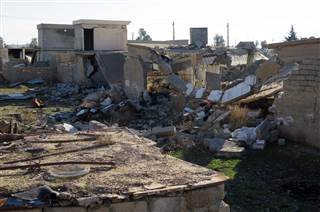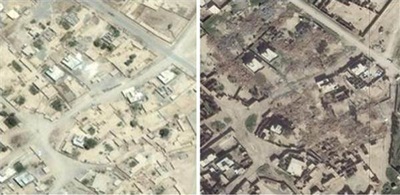The human-rights group said it had documented a "concerted campaign" by Kurdish forces to forcibly displace Arab communities "to punish them" for "perceived sympathies" to ISIS.
Kurdistan's Regional Government rejected the allegations of a concerted campaign, as did U.S. military officials.
U.S.-backed Kurdish forces have been leading the charge in driving ISIS out of areas the militants seized when they swept through northern Iraq in 2014.
While Amnesty acknowledged that Kurdish authorities have faced "unprecedented" humanitarian and security challenges since ISIS seized large parts of northern Iraq, it said "these difficult circumstances cannot excuse deliberate destruction and other serious abuses" committed by Kurdish forces and other militias.
A photo released by Amnesty International on shows destroyed homes in the village of Barzanke in Iraq's Diyala province. AFP - Getty Images
The report was based on field investigation in 13 villages and towns plus testimony from over 100 eyewitnesses which was corroborated by satellite images, according to Amnesty.
It cited evidence of forced displacement and large-scale destruction of homes in Ninewa, Kirkuk and Diyala provinces, which were recaptured by Peshmerga forces from ISIS between September 2014 and March 2015.
One eyewitness cited in the report told Amnesty that his village, Tabaj Hamid, was "flattened" by the Kurdish forces, known as the Peshmerga.
"They bulldozed the village, I don't know why," Maher Nubul told researchers. "There is nothing left."
Amnesty International said its researchers had visited the area and found Tabaj Hamid was razed to the ground, with satellite images showing not a single structure left standing. Satellite images also showed what appeared to be "possible bulldozer tracks" where buildings once stood, the report added.
Satellite images provided by Amnesty International show Jumeili, Iraq, on June 23, 2014 (left) and then on January 20, 2015. Amnesty International
Generally more experienced and more effective on the battlefield than their counterparts in the Iraqi army, Kurdish forces have played a vital role in containing ISIS in northeastern Iraq.
The Kurdistan Regional Government denied its forces had destroyed Arab homes and prevented locals from returning to their communities, calling the Amnesty report "not neutral at all."
"All villages that were under the control of ISIS are destroyed by ISIS," said Dindar Zebari, a spokesman for the Kurdistan Regional Government. "We did not try to displace the Arabs."
The U.S. military works closely with the Kurds, providing arms, training and advice for their battles against ISIS.
U.S. military officials told NBC News they were aware of "isolated incidents" where Kurdish forces appeared to have taken revenge but found no evidence of the "widespread campaign" alleged by Amnesty.
The U.S. has urged Kurdish leadership to hold those responsible for any such incidents accountable, according to one senior official.
Amnesty's report was released shortly after the United Nations announced that at least 18,802 civilians have been killed and millions of others forces from their homes in Iraq in ISIS-linked violence in less than two years.
"The violence suffered by civilians in Iraq remains staggering," said the report by the Office of the United Nations High Commissioner for Human Rights."
Source http://www.nbcnews.com/storyline/isis-terror/kurdish-forces-are-waging-revenge-campaign-iraq-amnesty-international-n500106



 RSS Feed
RSS Feed